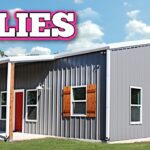Thinking about a tiny manufactured home? Discover the top five reasons you might want to reconsider this choice before making a purchase.
Limited Space and Storage Challenges
Tiny manufactured homes offer a compact living experience, but this can lead to significant limitations in space. Many buyers underestimate how much space they actually need for their belongings.
With limited square footage, storage becomes a challenge. You may find yourself constantly decluttering or struggling to find a place for essential items.
Moreover, the design of these homes often prioritizes aesthetics over functionality. This can result in awkward layouts that don’t maximize usable space.
For families or individuals with hobbies requiring equipment, the lack of storage can be a dealbreaker. Consider how much space you truly need before committing to a tiny home.
Resale Value and Market Demand

Investing in a tiny manufactured home may not yield the expected returns. The market for these homes can be unpredictable, and resale value is often lower compared to traditional homes.
Potential buyers may be hesitant due to the unique nature of tiny homes. This can lead to longer selling times and lower offers when it comes time to sell.
Additionally, zoning laws and regulations can affect the marketability of tiny homes. Some areas have restrictions that could limit your ability to sell or rent out your property.
Understanding the local real estate market is crucial. Researching comparable sales can help you gauge whether a tiny manufactured home is a sound investment.
Quality of Construction and Durability
Many tiny manufactured homes are built with cost-effectiveness in mind, which can compromise quality. Cheaper materials may lead to issues down the line, including maintenance problems.
Durability is a significant concern, especially in extreme weather conditions. Tiny homes may not withstand harsh climates as well as traditional homes, leading to potential repair costs.
Buyers should pay close attention to construction standards and materials used. A thorough inspection can reveal potential issues that may not be immediately apparent.
Investing in a tiny home with lower construction quality can lead to frustration and unexpected expenses. It’s essential to prioritize quality over price when making your decision.
Limited Amenities and Lifestyle Restrictions
Living in a tiny manufactured home often means sacrificing certain amenities. Many models come with minimal kitchen space, limited bathroom facilities, and fewer appliances.
This can impact your daily routine and lifestyle. Cooking, entertaining, or even just relaxing may feel cramped and uncomfortable.
Moreover, some communities that host tiny manufactured homes may impose lifestyle restrictions. These can include rules about landscaping, exterior modifications, or even pet ownership.
Understanding the community rules and the limitations of tiny living is vital. Make sure it aligns with your lifestyle before making a purchase.
- Research zoning laws and regulations in your desired area.
- Explore various financing options and prepare for potential challenges.
- Assess utility access and infrastructure before purchasing.
- Create a detailed inventory of your belongings to streamline decluttering.
- Evaluate the proximity of recreational and social activities to your tiny home.
- Compare insurance quotes from multiple providers for the best coverage.
- Stay informed about market trends and demand for tiny homes.
- Research sustainable building practices and energy-efficient appliances.
- Engage with community forums for emotional support and shared experiences.
Frequently Asked Questions (FAQ)
What are the main drawbacks of tiny manufactured homes?
Tiny manufactured homes often lack space for storage and personal belongings, which can lead to clutter. Additionally, they may have limited amenities and lower resale value, making them less appealing for long-term investment. Maintenance issues can also arise due to their compact design and construction materials.
How do tiny manufactured homes affect family living?
Living in a tiny manufactured home can strain family dynamics due to limited personal space. Privacy becomes a challenge, especially for larger families. Shared areas can lead to conflicts, and the lack of room for activities may hinder family bonding and relaxation.
Are tiny manufactured homes suitable for long-term living?
While tiny manufactured homes can be appealing for short-term living, they may not be ideal for long-term residency. The limited space can lead to discomfort over time, and the potential for rapid depreciation can make them a less viable option for those seeking stability.
What are the financial implications of buying a tiny manufactured home?
Buying a tiny manufactured home can seem cost-effective initially, but hidden costs like land rental, maintenance, and insurance can add up. Additionally, their lower resale value may result in a financial loss if you decide to sell, making them a risky investment for the future.
How does zoning affect tiny manufactured homes?
Zoning laws can significantly impact where tiny manufactured homes can be placed. Many areas have strict regulations regarding size and type of housing, which may limit your options. It’s essential to research local zoning laws to ensure compliance and avoid potential legal issues.





















